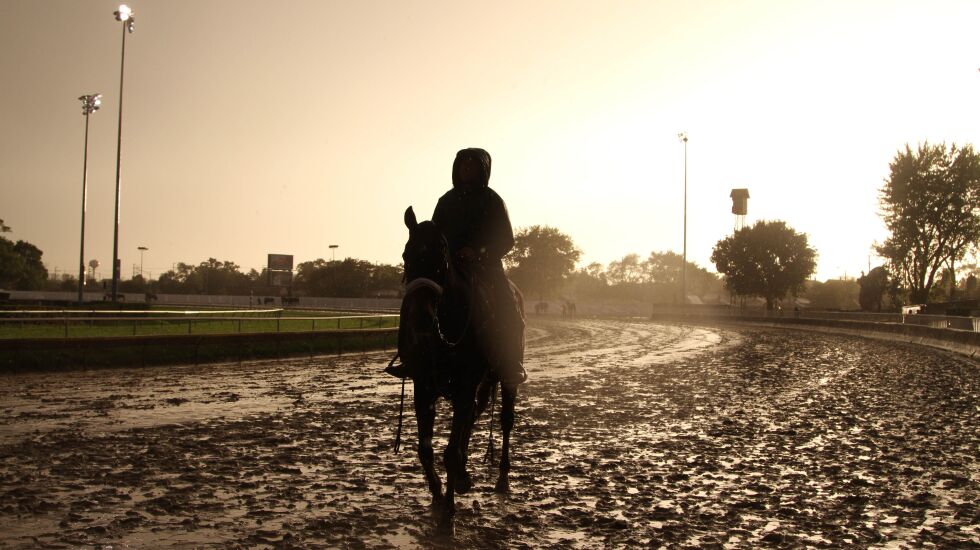
A group of investors says they’re ready to trot out a new harness racetrack and casino in the far south suburbs that would provide a much-needed whip to Illinois’ struggling horse racing industry — but they need state lawmakers to lift the starting gate.
Prospective partners in the newly formed Greenway Entertainment Group LLC envision a “first-class racino destination” with 1,200 slot machines just off Interstate 57 in Richton Park, and they say they can lock up the $350 million needed to make it a reality.
There’s just one thing reining in their proposal: state law allows Hawthorne Race Course — the Chicago area’s only surviving track — to veto any potential new track within 35 miles of their storied 132-year-old grandstand in Stickney.
“They’re blocking other viable projects,” said Roy Arnold, the former president of the shuttered Arlington International Racecourse who’s part of the Greenway bid. “We want to make this industry sustainable and the clock is ticking.”
The veto provision was negotiated as part of a statewide gambling expansion law passed in 2019 that allowed existing tracks to add casino games and authorized a new harness racetrack to open in the south suburbs. The expansion, pushed by Gov. J.B. Pritzker to help fund his signature $45 billion infrastructure improvement plan, also added six new casinos and introduced sports betting.
Nearly four years later, the sports betting industry is flourishing and the casino projects are moving forward — but Hawthorne still hasn’t installed the slots that were viewed as a lifeline for the industry. And their plan for a new south suburban track crashed out of the gate.
A bill introduced in Springfield last month by state Sen. Patrick Joyce would eliminate Hawthorne’s veto power this summer, opening the door for the Greenway group to apply to break ground on a track in the Essex Democrat’s district.
“We’re ready to move forward since they [Hawthorne] apparently aren’t. The horsemen can’t wait much longer,” said Mike Campbell, the former president of the Illinois Thoroughbred Horsemen’s Association. He’s also part of the Greenway group along with suburban developers Drew Daniels and Tom Walsh, plus an unspecified number of other investors.
“We’re trying to raise the phoenix from the ashes,” Campbell said.
Their 80-acre site near Sauk Trail was previously a landfill that’s now being prepared for commercial development.
“We would love to see this type of investment in the community,” Richton Park Village President Rick Reinbold said.
Hawthorne President Tim Carey has contended that his family’s track has kept the harness industry afloat since Maywood and Balmoral parks shut down in 2015, a role that has become even more vital since Arlington Park was shut down by Churchill Downs Inc. and sold to the Chicago Bears.
“We wanted protection,” Carey said of the veto provision during a March 22 state Senate Executive Committee meeting on the new bill. “We are a united group, but I have to tell you: doing what they’re suggesting [eliminating the veto] extremely hurts us.”
Carey, called before the Illinois Gaming Board in mid-March to explain the delay in Hawthorne’s $400 million racino renovation that was announced in 2020, pointed to supply chain issues related to COVID-19 and a volatile financing market for the hold-up.
Carey told the Senate panel that while they “very, very easily could have just put 1,200 slots in the grandstand,” they wanted to make sure “we got that racetrack right.”
“We felt an obligation to the horse racing industry,” he said. “The benefit in doing that and having a project of this caliber is long term for Illinois horse racing.”
As for a new harness track, Carey had partnered with developer Rick Heidner on a proposal that would’ve broken ground at the former Tinley Park Mental Health Center. But that plan was scrapped in late 2019 after Heidner’s name surfaced in a federal search warrant related to a public corruption investigation and Gov. Pritzker’s office refused to sell the land for the project.
Heidner was not a target of the federal probe and was not accused of wrongdoing.
Now, Carey says Hawthorne is “actively going after” a new south suburban location “and we can do that simultaneously.”
“We believe that we can get Hawthorne Race Course up and running by the end of 2024, and the south suburban one will be shortly thereafter,” Carey said.
Campbell said an “inexplicable” delay would be dire for an industry where dwindling purses have sent trainers to neighboring states where racinos have made tracks more lucrative.
“We’re thankful Hawthorne has continued racing, but it’s time to move the ball forward,” Campbell said, urging the governor to push the track to “fulfill the intent of the 2019 gambling bill.”
A spokesperson for the governor said he’d “thoroughly review any legislation that the General Assembly sends to his desk” but wouldn’t take a side on the bill aiming to revoke Hawthorne’s veto power.







